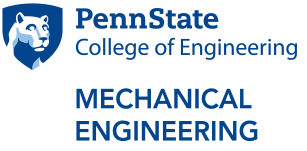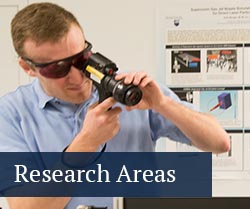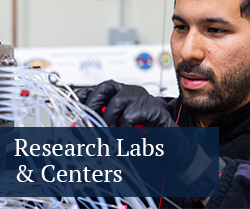
Graduate Programs in Mechanical Engineering
Our graduate degrees have limited formal course requirements. You and your adviser can tailor a program to your needs and educational goals. With our many tenured faculty and the breadth of mechanical engineering focus areas, you can pursue an area in the mechanical engineering field that is important to you.
Our research programs are especially strong in areas such as energy conversion and storage, combustion, controls, biomedical devices, design and manufacturing, bioinspired engineering solutions, and future transportation systems.
Students usually select courses and write a thesis or paper in one or more of the following general fields:
Thermal Sciences
- Heat Transfer
- Combustion
- Fluid Mechanics
Mechanical Sciences
- Systems and Controls
- Dynamics, Vibrations, and Noise Control
- Solid Mechanics and Mechanical Design
Suggested Core Courses
The following listing of suggested core courses is provided for guidance. Your adviser and/or committee may suggest alternative or additional courses. Most of the courses listed below are offered on a regular basis. New courses may be offered occasionally and numbered as ME 597. Check the schedule of courses on LionPath for a list of courses offered each semester.
Heat Transfer
- ME 512: Heat Transfer—Conduction
- ME 513: Heat Transfer—Convection
- ME 514: Heat Transfer—Radiation
- ME 521: Foundations of Fluid Mechanics I
- ME 523: Numerical Solutions Applied to Heat Transfer and Fluid Mechanics Problems
Combustion
- ME 521: Foundations of Fluid Mechanics I
- ME 530: Fundamentals of Combustion
- ME 532: Turbulent and Two-Phase Combustion
- ME 535: Physics of Gases
- ME 537: Laser Diagnostics for Combustion
Fluids
- ME 423: Introduction to Numerical Methods in Fluid Dynamics
- ME 512: Heat Transfer—Conduction
- ME 513: Heat Transfer—Convection
- ME 520: Compressible Flow II
- ME 521: Foundations of Fluid Mechanics I
- ME 522: Foundations of Fluid Mechanics II
- ME 523: Numerical Solutions Applied to Heat Transfer and Fluid Mechanics Problems
- ME 524: Turbulence and Applications to CFD: DNS and LES
- ME 525: Physics Modeling in CFD
Systems and Controls
- ME 550: Foundations of Engineering Systems Analysis
- ME 554: Digital Process Control
- ME 555: Automatic Control Systems
- ME 556: Robotic Concepts
- ME 559: Nonlinear Control and Stability
Dynamics, Vibrations, and Noise Control
- ME 571: Foundations of Structural Dynamics and Vibrations
- ME 572: Experimental Modal Analysis
- ME 573: Designing Quiet Structures
- ME 580: Advanced Dynamics of Machines
- ME 581: Simulation of Mechanical Systems
Solid Mechanics and Mechanical Design
- ME 560: Solid Mechanics
- ME 563: Nonlinear Finite Elements
- ME 564: Elastic and Dynamic Stability of Structures
- ME 565: Optimal Design of Mechanical and Structural Systems
- E MCH 507: Theory of Elasticity and Applications
- E MCH 560: Finite Element Analysis

Resident Degrees
- M.S. in Additive Manufacturing and Design
- M.S. in Mechanical Engineering
- Ph.D. in Mechanical Engineering
Online Degree
Related Links
- Mechanical Engineering Graduate Student Handbook
- Graduate Degree Programs Bulletin
- Schedule of Courses
- Thesis & Dissertation Information
- Office for Research Protections
- Writing Guidelines
- Avoiding Plagiarism Tutorial
- Scholarship and Research Integrity (SARI)
- Graduate Student Mentoring






